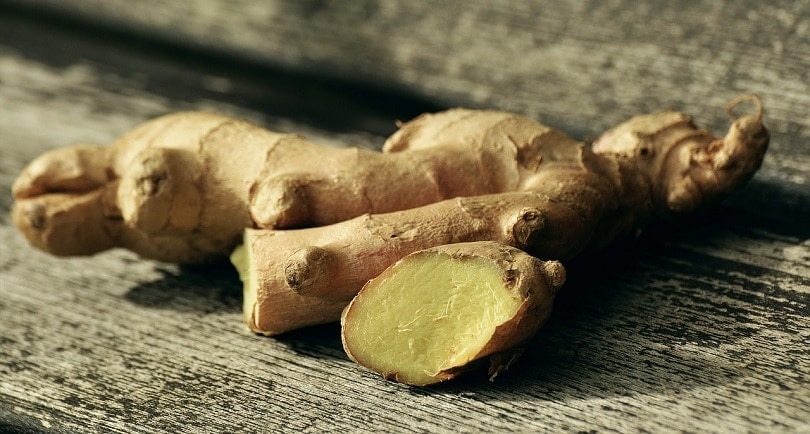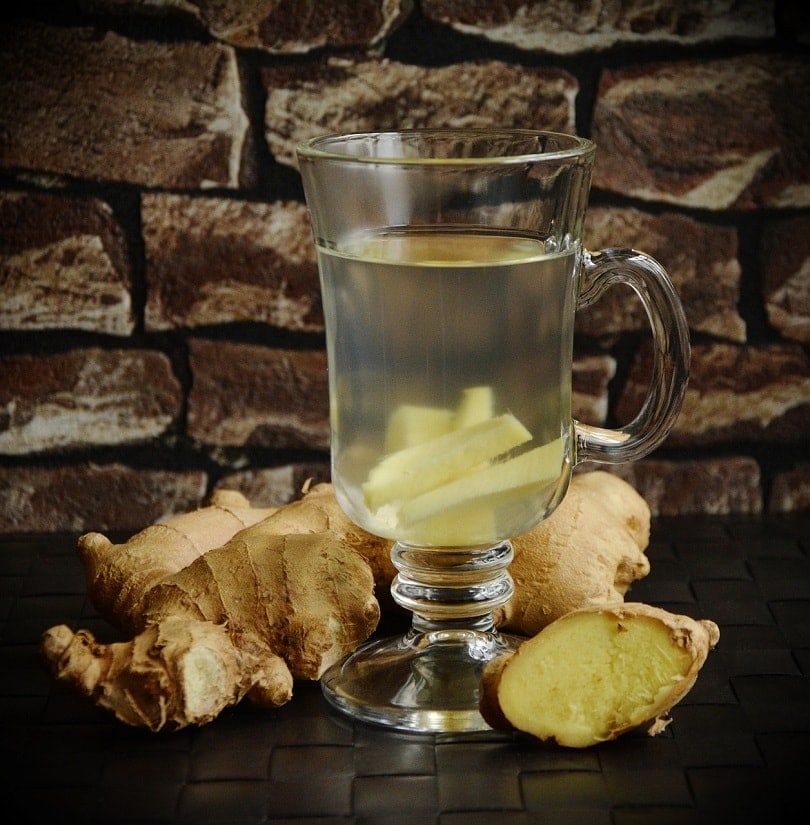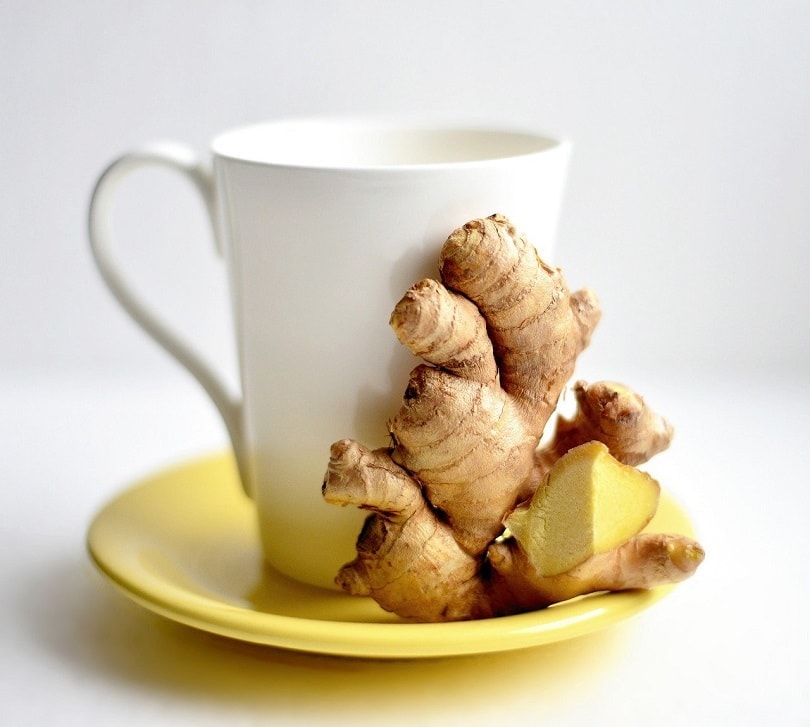Do You Need to Peel Ginger Before Juicing? (A Complete Guide)
-
Nicole Wells
- Last updated:

Do you ever wonder whether you should peel your ginger before you use it in a juicer? If you are a fan of juicing, the answer is likely, yes. The answer to the question at hand, however, is no. There is no need to peel your ginger before juicing it in your latest beverage concoction. That being said, it can make a difference in the outcome of your juice.
In the article below, we will dive deeper into why peeling your ginger is not necessary, but could still be preferable. We will also share the best blender for juicing ginger, plus some other little-known ginger-juicing facts with some tips on what to do with the leftovers if you decide to peel.
The Advantages of Peeling Ginger
When it comes to peeling ginger pre juicer, there aren’t a lot of advantages to leaving it on. In fact, the biggest draw is it’s simply easier and less work. While the skin does have some added nutrients, they are nothing to write home about, and you will still get the majority from the ginger’s plum.

While we are on the subject, ginger is considered a spice and an herb (depending on the form) with many health benefits. WebMD indicates that it’s good for the mind and body among other things such as:
- Quickens the metabolism
- Helps with digestive issues
- Lowers risk of heart disease
- Lowers risk of some cancers
- Reduces cold and flu symptoms
- Relieves pain
- Reduces inflammation
- Lowers blood sugar
- Promotes oral health
- Eases menstruation discomfort
That being said, the amount of ginger you consume is important. Too much can have health risks such as stomach issues. Also, because it lowers your blood sugar levels, those that are pregnant or diabetic should consult a doctor before eating the root.
As we mentioned above, you don’t need to peel ginger. Your juicer will take care of the skin…for the most part. Removing the tough skin, however, has a few advantages. Interestingly enough, a lot of it has to do with the age of the root.
Peeling New Ginger
Younger and fresh ginger has thinner skin. While you don’t need to peel it as your juicer can easily take care of the chore for you, the biggest benefit here is riding the fruit of any pesticide residue. As most of us know, pesticides and insecticides are used on crops to keep them from “insect invasion”. While it does its job remarkably well, ingesting it can cause a lot of health risks for us as the chemicals are toxic.
According to the Environmental Protection Agency (EPA), pesticides and insecticides can cause birth defects, cancers, and heart issues among the top risks though there are many others. Washing the root in cold water will generally take care of any leftover chemicals from the crop, however.
Other than that, as the taste is not affected, peeling fresh ginger is a personal preference. It can also depend on how you are using it. For example, if you plan to use ginger juice for cooking, you will get a smoother outcome if you peel it (which goes for older ginger, as well).
Peeling Older Ginger
Peeling or not peeling older ginger can make a bigger difference than if the root is fresh. While the pesticide issue remains the same, the older spice develops some different characteristics in its old age. For example, the skin becomes tougher and thicker. It will make it more difficult for your juicer to process.
Another issue is taste. The thicker skin has a more bitter taste that could be discernable in your juice and other recipes. Not only that, but it will also not be as smooth. Equally important, a ginger root that has been sitting in the fridge can take on that stale “fridge-like” taste that is never pleasant.
For these reasons, many people prefer to peel their older ginger while giving a good rinse to their fresh root…which brings us to our next topic.
Preparing Ginger for Juicing
Whether you are peeling your ginger or not, it’s important to rinse it in cold water first and remove any dirt or debris that can be stuck to it. Next, you want to inspect the herb for any signs of mold. Mold is a common alignment of this root, so it’s important that you check for it as it can cause health issues if consumed. If you happen to find any, you can cut off the infected section and use the rest.

If you are leaving the skin on, you are all set to start juicing. We do suggest cutting the ginger up into small sections, though. As this is a hard, dense root, cutting it into smaller pieces will go a long way to keep it from clogging or jamming your juicer.
If you prefer to peel, the easiest way to do so is with a spoon instead of a standard peeler. Use the concave side of the spoon to scrape off the skin. The skin will come off relatively quickly depending on the age of the ginger.
Best Juicer for Ginger
If you regularly use ginger in your juicer, we recommend opting for a mid-level to a high-end machine. As mentioned, the root is hard and dense, so you will need an appliance that can handle it. Even if you use ginger once a week, you still want to opt for one that is not going to clog or jam easily.
- Slow Masticating: Though they might be more expensive, a slow-masticating juicer is the best way to go. It has the power to grind down the toughest roots while still giving you a smooth finished product.
- Triturating: This type of juicer is just as effective at grinding down the ginger as our first pick, but it is more likely to get clogged due to the smaller openings. This is also a better option if you need larger quantities of juice.
- Centrifugal: This last option is good if you only use ginger once in a while. While this type of juicer can handle the tough root, you will need to cut it into much smaller pieces than you would with the other two options. Unfortunately, even if you do so, you will still not get the smoothness like you would from the slow masticating and triturating juicers. The attraction here, nonetheless, is the cheaper price tag.
Uses for Ginger Skin
If you tend to keep ginger for longer periods or you don’t like to waste any of the herbs, there are other uses for the skin. There is a wide range of uses, so we narrowed it down to the most unique and practical purposes.
- Steam with Other Foods: Adding ginger to the pot when you’re steaming vegetables, potatoes, fish, and other foods is a great way to add a spicy kick to the meal. This will also give you some added nutrients.
- Marinades and Salad Dressings: Ginger is a great ingredient to add to marinades, sauces, and salad dressings. The earthy and savory flavor can take a normal recipe from boring to amazing.
- Cooking: As we mentioned above, ginger is a great ingredient to add to many recipes, but not everyone loves the strong flavor. Adding a bit of the peel can give you that “extra something” you are looking for and gives you extra nutrients without going overboard with the ginger plum.
- Baking: We have all heard of ginger snaps and gingerbread, but there are dozens of other baking scenarios where ginger peels make a great addition. Add it to a cake mix, snickerdoodle cookies, and many other baking recipes.
- Ginger Tea: If you want to start your day with a bracing cup of tea, your leftover ginger peels will be just the thing. Using the peels instead of tea, or adding it to a standard lemon tea, makes for a great morning cup that can boost your cognitive function, give you energy, and even help cure a hangover.
- All-Purpose Ginger Broth: Ginger peels can quickly become an all-purpose ginger broth that can be used in many different recipes including all kinds of soup. The best part, you can freeze it to use later when the menu calls for it. On a side note, you can also freeze ginger peels to use later, too. Just make sure you store them in single layers so they don’t all freeze together.

Conclusion
To recap on the original question, there is no need to peel your ginger before juicing. As long as you wash and inspect it, it will not cause any harm. That being said, things like the age of the root can make a difference. The older it is and the longer it sits in your fridge, the more bitter it will taste. You will also notice more texture (or pulp) with older unpeeled ginger.
We hope this article has answered all of your ginger juicing questions, and it has given you some new ideas on how to make use of every part of this nutritious and delicious herb.
See also: 19 Best Ginger Plant Varieties to Grow at Home (With Pictures)
Featured Image Credit: congerdesign, Pixabay
Contents


